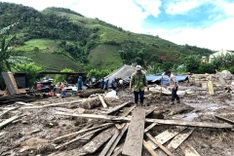The UK Meteorological Office (Met Office) has recently released a forecast indicating that 2025 could be among the top three hottest years globally. The forecast raises further concerns about the increasingly severe impacts of climate change.
Accordingly, the global average temperature in 2025 is expected to be 1.29 to 1.53°C higher than pre-industrial levels. Although this is lower than the record-breaking temperatures of 2023 and 2024, it still reflects the ongoing trend of global warming without signs of slowing down.
While the El Nino phenomenon has contributed to increasing temperatures in the past two years, it is not the primary factor driving the long-term warming trend.
“It is difficult to predict exactly how natural disasters will unfold next year, but it is almost certain that, with the rising global temperatures, heatwaves will become increasingly intense and severe,” said Mai Van Khiem, director of the National Centre for Hydro-meteorological Forecasting, on December 18.
In 2024, Vietnam endured increasingly intense and prolonged heatwaves due to the combined effects of climate change and rising global temperatures. First heatwaves in early April caused temperatures rise sharply to a record high of 42.2°C in the northern mountainous province of Son La.
Major urban centers, including Hanoi, Ho Chi Minh City, and Da Nang, experienced higher temperatures than rural areas due to the urban heat effect. Many places in Hanoi and Ho Chi Minh City recorded high temperatures of 37-39°C for days.
In addition to severe heatwaves, the meteorological official also warned about more occurrences of heavy rains in mountainous and urban areas associated with flash floods, landslides, and urban flooding.
“The frequency and likelihood of strong storms and super storms will increase. Therefore, we need to pay attention to upgrading disaster response infrastructure to be ready to deal with increasingly extreme natural disasters,” said Khiem.
In such a complex situation, Deputy Director-General Hoang Duc Cuong of the General Department of Meteorology and Hydrology emphasized the need for the National Centre for Hydro-meteorological Forecasting to innovate its operations toward efficiency.
He urged the centre to embrace cutting-edge technologies, including artificial intelligence; implement comprehensive digital transformation; continue supporting regional forecasting services and execute specialized projects effectively; and strengthen inter-agency coordination and proactive communication before, during, and after natural disasters.




















